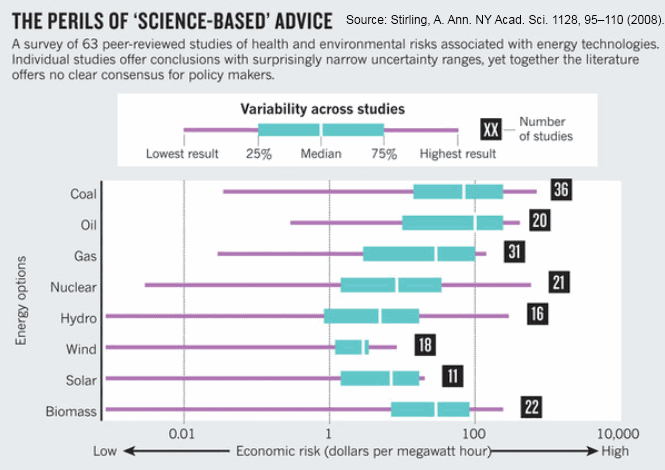|
|
|
|
|
|
|
News & Views item - January 2011 |
![]() Experts Should Avoid Pressures to Oversimplify Their Advice. (January 3,
2011)
Experts Should Avoid Pressures to Oversimplify Their Advice. (January 3,
2011)
![]()
![]()
 The
research director at SPRU (Science and Technology Policy Research) who also
co-directs the joint Centre for Social Technological & Environmental Pathways to
Sustainability at Sussex University, Andy Stirling, is a former director of
Greenpeace International and has served on several policy advisory committees,
including the UK Government's Advisory Committee on Toxic Substances and the GM
Science Review Panel as well as the European Commission's Expert Group on
Science and Governance.
The
research director at SPRU (Science and Technology Policy Research) who also
co-directs the joint Centre for Social Technological & Environmental Pathways to
Sustainability at Sussex University, Andy Stirling, is a former director of
Greenpeace International and has served on several policy advisory committees,
including the UK Government's Advisory Committee on Toxic Substances and the GM
Science Review Panel as well as the European Commission's Expert Group on
Science and Governance.
In a "Comment" article (Nature: 468, 1029–1031) Dr Stirling puts the case: "When knowledge is uncertain, experts should avoid pressures to simplify their advice. Render decision-makers [should be made] accountable for decisions... An overly narrow focus on risk is an inadequate response to incomplete knowledge... [but] there lurks a hidden assumption about how scientific expertise can best serve society. Expert advice is often thought most useful to policy when it is presented as a single 'definitive' interpretation."
And that in turn encourages policy-makers "to pursue (and claim) 'science-based' decisions. It is also not uncommon for senior scientists to assert that there is no alternative to some scientifically contestable policy. After years researching — and participating in — science advisory processes, I have come to the conclusion that this practice is misguided... It leaves science advice vulnerable to the social dynamics of groups — and to manipulation by political pressures seeking legitimacy, justification and blame management."
As one of his examples, Dr Stirling refers to sixty-three peer reviewed studies of the effects of eight methods for the production of electrical energy and shows the range of perceived "economic risk" of each among the studies.

In Dr Stirling's view: "there is always pressure on expert committees to reach a 'consensus' opinion. But what then "is most accurate and useful for [determining] policy"?
Take the hard option: "set out a measured array of contrasting specialist views, explaining underlying reasons for different interpretations of the evidence." Even though the political pressures are for a consensual opinion, the more complex "is more consistent both with scientific rigour and with democratic accountability."
The approach that Dr Stirling favours is that which clearly places the onus on the policy decision-makers, e.g. the federal cabinet. "In my experience, it is the single definitive representations of science that are most vulnerable to political manipulation. Plural, conditional approaches are not immune, but they can help make political pressures more visible."
Well, can our boffins engineer our political representatives to undertake what would be clearly a mentally significantly more tasking approach, keeping in mind it is not unheard of for those in a position of determining policy to "assist" those advising them to favour a particular alternative while diminishing their accountability.